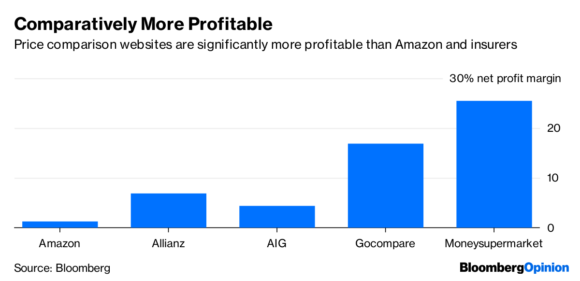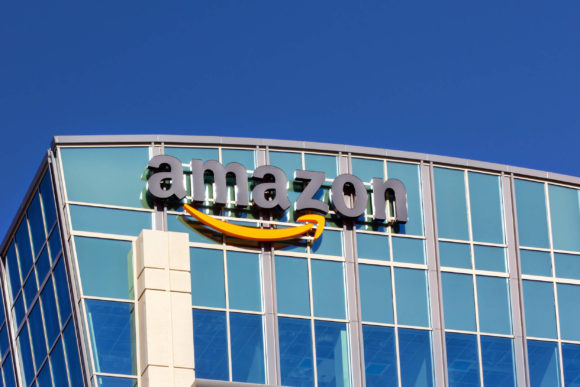Whenever Amazon.com Inc. eyes expansion into a new industry, the stalwarts of that space shudder.
A Reuters report on Thursday that the e-commerce giant has been talking to insurers about introducing a price comparison website in the U.K. was no different. Incumbents Moneysupermarket.com Group Plc and GoCompare.com Group Plc fell as much as 4.7 percent and 10 percent respectively.
But for traditional insurers, Amazon’s proposition should spur excitement. Firms such as Allianz SE and American International Group Inc. have been slower than startups such as Lemonade Inc. to use the reams of data generated by internet services to attract new customers and price their offerings better.
Which is where Amazon comes in. Its financial clout means it can undercut the commission that the relative minnows Moneysupermarket and Gocompare charge insurers for promoting their products. Those two companies enjoy net profit margins which are some 10 times wider than Amazon’s, giving the American firm plenty of leeway to ask for less.
The project would also be adjacent to Amazon’s core expertise, connecting the provider of a product with a potential customer. The likelihood of Amazon offering its own insurance product – something the Information suggested the tech giant was considering in June – seems slim. It would require strict regulation, the tech world’s bugbear.
But insurers ought to be licking their lips at the prospect of leveraging Amazon’s vaults of user data and ability to understand it. That’s where the real value will lie.

It could be similar to the impact that Facebook Inc. and Alphabet Inc.’s Google have had on the advertising industry. The two companies’ success (they secure one in four ad dollars spent globally) stems not just from the dominance of their platforms, but from their ability to demonstrate their effectiveness to advertisers.
The Silicon Valley firms can illustrate in great detail the success of a given marketing campaign: how many eyeballs it reached, how many sales leads it generated, or how many subscribers it attracted. The companies invented a measurement language that didn’t exist when ads were dominated by print, broadcast, billboards and direct mail marketing.
For insurers, Amazon will be able to serve up a keener understanding of the end customer, the risks associated with insuring them, and what upselling opportunities exist – if a customer has bought the latest version of Call of Duty, for instance, it’s highly likely they also own an Xbox or Playstation. Insurance could be offered for that console.
Amazon’s push into home automation also gives the potential to cross-sell. Just as health insurers offer incentives to their customers to use fitness trackers, and car insurers encourage the installation of black boxes in vehicles to track behavior, Amazon could help home insurers by selling security cameras and other smart home gear.
For insurers, this ought to be an opportunity to offset the pressure on premiums and dwindling investment returns. For once, an industry should be excited at the opportunities provided by Amazon, not afraid.
Related:
- Amazon Plans Global Disruption of Health Care Marketplace
- After Amazon Conquers Banking, Insurance Could be Next
- Liberty Mutual Giving Consumers a Voice in Insurance via Amazon’s Alexa
- What Insurance Industry Can Learn from Amazon About Customer Satisfaction
- The ‘Switching’ Economy: Consumers Open to Buying Insurance from Google, Amazon, Verizon
- Exclusive: Google to Shut Down Online Insurance Site, Partners Say
- Insurance Industry Analyzes Google’s Failed Online Insurance Experiment
Topics Carriers
Was this article valuable?
Here are more articles you may enjoy.



 Judge Awards Applied Systems Preliminary Injunction Against Comulate
Judge Awards Applied Systems Preliminary Injunction Against Comulate  ‘Structural Shift’ Occurring in California Surplus Lines
‘Structural Shift’ Occurring in California Surplus Lines  Insurance Broker Stocks Sink as AI App Sparks Disruption Fears
Insurance Broker Stocks Sink as AI App Sparks Disruption Fears  BMW Recalls Hundreds of Thousands of Cars Over Fire Risk
BMW Recalls Hundreds of Thousands of Cars Over Fire Risk 

